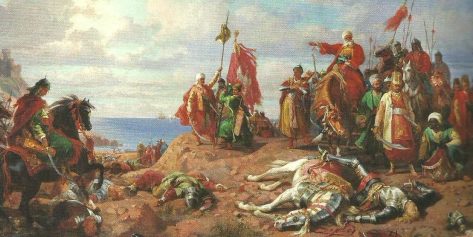Military Heritage Magazine January 2017
Janos Hunyadi “Scourge of the Turks”
By Ludwig Heinrich Dyck

Hungary’s national hero, Janos Hunyadi was one of the great captains in the war between Europe and the Ottoman Turks. Hunyadi rose from obscurity to dominate Hungarian politics in the first half of the 15th century.
The 15th century historian Thuroczi represented Hunyadi as a “man of war, born to bear arms.” A devout Catholic, Hunyadi would leave his bed at night to spent hours praying at the chapel. He believed in strict discipline for himself and for his men.
During the spring of 1441, Mezid Pasha, Bey of Vidin, led 17,000 sipahis (Ottoman cavalry) into central Transylvania. The panic spread by Mezid’s ravages drew Hunyadi into an ill-prepared engagement at Santimbru. Hunyadi barely escaped but rallied peasant reinforcements and riposted only a few days later. Mezid ordered his best troops to take out Hunyadi. “To kill a lion, his heart must be pierced,” Mezid told his troops, advising them that Hunyadi “wears a silver helmet and carries a shield emblazoned with a raven. Mounted on a white horse, he is always found in the thick of battle.” Forewarned by a spy, Hunyadi let a volunteer, Simon Kemeny, wear his armor. Kemeny was slain but Hunyadi was left free to lead the attack and defeat Mezid on March 22. A wagonload of severed Ottoman heads was sent back to Buda.
Hunyadi won many such victories against the Turks but also suffered reverses such as at Varna in 1444. At the time, Hunyadi served under the teenage Wladyslaw III (Ulaszlo I) King of Poland and Hungary.
Victory all but in his grasp, Wladyslaw entered the fray with 500 cavalry. The young king smote through the janissaries, but then his horse was killed under him. Wladyslaw was hurled to the ground where a janissary swooped off his head and hoisted it on the tip of his lance. Galloping back to the battle, Hunyadi tried in vain to stem the growing panic. The sun set upon a vanquished Hungarian army.

Though at times defeated, Hungary never faltered in his resolve to carry on the war: “We have had enough of our men enslaved, our women raped, wagons loaded with the heads of our people, the sale of chained captives, the mockery of our religion…we shall not stop until we succeed in expelling the enemy from Europe.”

Hunyadi’s greatest victory, no doubt was his 1456 relief and defense of Belgrade against Sultan Mehemed II “The Conqueror.”
By nightfall the Turks were fighting in the streets. Hunyadi ordered his men to throw tarred wood and blankets saturated with sulfur into the moat. Set alight, the moat erupted in flames and burned the Ottomans trying to gain the walls. The isolated janissaries in the city were slaughtered.
The fighting was so dreadful that to Ottoman historian Tursun Bey it seemed as if “even the dead climbed out of the fortress and fell upon the army of Islam.”
On August 11th, less than a month after forcing the Ottomans to retreat, Hunyadi passed away from illness. In all probability he succumbed to the plague that had spread from Mehemed’s army into Belgrade. With his last words, the dying Hunyadi pleaded for the continued defense of Hungary and Christianity.
Hunyadi’s deeds elevated him into the realm of legend, to become Torokvero, the “scourge of the Turks.”
L. H. Dyck’s full article on the life of Janos Hunyadi appeared in Military Heritage January 2017.


If only there was a man like him today. Islam is an inherently supremacist religion that is incapable of tolerating anything else. Since its inception it has always conquered by the sword and, unlike Christianity, it never underwent a reformation that promoted separation of state and religion.
LikeLiked by 1 person